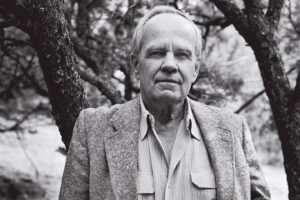
Cormac McCarthy, RIP
Cormac McCarthy is gone. Sad. I didn’t know him personally. I never even heard him speak Unlike most bestselling authors, McCarthy didn’t do book signings or media interviews to promote his books. He was a very solitary person.
But he was a very good writer. He told emotionally compelling stories. He created characters that were unforgettable. His range was both vertical and horizontal. His dialogue was on a par with Twain’s. And in terms of American prose style, he was probably the most important novelist since Hemingway.
I remember the first time I read his writing. It was the opening pages of All the Pretty Horses.
Here it is:
“The candleflame and the image of the candleflame caught in the pierglass twisted and righted when he entered the hall and again when he shut the door. He took off his hat and came slowly forward. The floorboards creaked. Under his boots. In his black suit he stood in the dark glass where the lilies leaned so palely from their waisted cutglass vase. Along the cold hallway behind him hung the portraits of forebearers only dimly down to him all framed in glass and dimly lit above the narrow wainscotting. He looked down at the guttered candlestub. He pressed his thumbprint in the warm wax pooled on the oak veneer. Lastly he looked at the face so caved and drawn among the folds of funeral cloth, the yellowed mustache, the eyelids paper thin. That was not sleeping. That was not sleeping.”
As you can see, McCarthy was a writer’s writer. Like Melville and Faulkner, two of the three novelists he admitted to admiring (the third was Dostoevsky), he crafted poetic sentences expressing complex and subtle ideas with beauty and grace. He was also, like Dostoevsky, a philosophical writer willing to write about difficult truths.
He was famously private. He kept to himself, rarely left his home, and turned down 99 interview requests for every one he granted. In that way – and now that I think of it, in several ways – he was the opposite of Hemingway, who was immensely social and sought out attention, almost any sort of attention, wherever he went.
McCarthy, or Cormac, as we Mules called him, was one of our favorite authors. (We permit ourselves to have first-name relationships with writers we believe would like to be part of our club.) We probably did four or five of his books, which is more than any other novelist, including Hemingway.
The fact is, Cormac McCarthy was the kind of writer that, if you were a serious reader or a committed writer, could not be ignored. We found, in the books we reviewed, bits and pieces here and there that we were able to criticize. But the criticisms were mostly nitpicking. And they were very few. It was much more common for us to read his sentences aloud and/or listen to them in awe.
Anyway, he’s gone now. And one thing that means is that he will have now less control over his celebrity than he did when he was living. He won’t be giving interviews, but neither will he be able to prevent people from writing about him based on anecdotal or even imagined information. My prediction is that, like Hemingway, McCarthy will not fade from recognition, notwithstanding his penchant for anonymity. It would not surprise me if, one day, he became as famous as Hemingway. And, ironically (which he would enjoy), he would have accomplished that considerable achievement by having lived a life as small and private as Hemingway’s was big and public.
 MarkFord
MarkFord